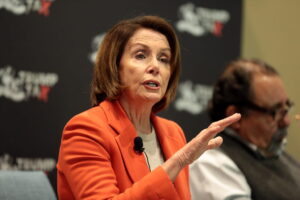Tag: impeachment
Election of 2020: President “Trumps” Impeachment
by Kyle Burgess on February 13, 2020
National and Global News
by Alexandra Huzyk ’20
News Staff
After a four-month period of impeachment processes, President Donald Trump has officially been acquitted of both articles of impeachment drafted against him, as determined by the trials conducted by the Senate.
In September 2019, a government whistleblower issued a complaint against President Trump. Soon after, Speaker of the House, Nancy Pelosi, called for an impeachment inquiry against President Trump, claiming that he had betrayed his Oath of Office and the election process.
The House Intelligence Committee was then tasked with investigation, and the Judiciary Committee drafted two articles of impeachment—one for abuse of power, and the other for obstruction of Congress. The House of Representatives approved both articles, which required a simple majority of votes.
The articles of impeachment were then passed on to the Republican-controlled Senate, which was responsible for conducting President Trump’s trial. The trial included opening and closing remarks from the Democratic House impeachment managers and President Trump’s team of lawyers, plus a 16-hour questioning period by senators. A super majority of 67 votes was needed to convict President Trump for each respective charge.
For the first article of impeachment—abuse of power—all Democrats and Independents voted guilty. All Republicans, with the exception of Utah Senator Mitt Romney, voted not guilty. The final tallies were 52 to 48 to acquit him of this first article.
Romney’s vote to convict President Trump “marked the first time in American history that a senator voted to convict a president of his own party in an impeachment trial,” as stated by NBC News. Romney defended his choice in a speech before the Senate, but continued to receive criticism from both President Trump and other members of the Republican Party.
For the second article of impeachment placed against Trump—obstruction of Congress—all Democrats and Independents voted guilty, while all Republicans voted not guilty. The final tallies were 53 to 47 to acquit Trump of this second article, split along party lines.
After President Trump’s acquittal, he promptly spoke out in a number of tweets. The first was a parody video illustrating his decision to continue running for reelection, ending with the message: “Trump 4EVA.” In a separate tweet, he claimed he would provide more commentary, “our Country’s VICTORY on the Impeachment Hoax.” President Trump will likely use the impeachment trial results to further vilify Democrats during his reelection campaign.
According to Gallup, a recent public opinion poll reported that President Trump’s approval rating hit the highest yet, at 49 percent. The public remains highly divided along partisan lines.
This division was further exacerbated in President Trump’s televised State of the Union speech on Feb. 4. After describing Democrats who support universal health care as socialists, President Trump urged Congress to support legislation to lower prescription drug prices. This was met with dissenting chants from Democrats.
President Trump also continued to emphasize policies aimed at helping black Americans, a group which overwhelmingly disapproves of Trump.
However, in conflict with these efforts, President Trump awarded conservative talk radio host Rush Limbaugh the Presidential Medal of Freedom. This award is the nation’s highest honor that a civilian can receive. In the past, Limbaugh has made precarious comments on race; particularly in regards to former President Barack Obama.
After President Trump concluded his State of the Union speech, he handed House Speaker Nancy Pelosi a copy of his speech. When she reached out to shake his hand, President Trump turned away. As Republicans cheered, Pelosi tore the copy of President Trump’s remarks in half.
Both the impeachment trials and the State of the Union speech are emblematic of continued bipartisan tensions, likely to be echoed in the 2020 presidential campaigns and elections.

photo courtesy of flickr.com
Election of 2020: Impeachment Trial Goes to the Senate
by Kyle Burgess on January 30, 2020
National and Global News

by Nicole Silverio ’22
This week, opening arguments began in the Senate regarding the House of Representatives’ impeachment of President Donald Trump. Both Democrats and Republicans have spent the last week making their case of whether r not to remove President Trump. After both sides has the opportunity to ask questions, they will vote on whether or not to subpeona witnesses not yet heard in the investigation.
On December 16, 2019, the House Judiciary Committee released a report explaining the charges against the President. The charges against him are abuse of power and obstruction of Congress. The Democratic Party, led by Speaker Nancy Pelosi, has accused President Trump of obstructing justice for contacting the Ukrainian president to investigate his political rival’s son. In October, the Intelligence, the Oversight and Foreign Affairs committees deposed witnesses involved with Ukrainian foreign policy testifying that Trump wanted the Ukrainian president, Volodymyr Zelensky, to publicly announce investigations into Joe Biden’s son, Hunter Biden and Burisma, a Ukrainian natural gas company that Biden had served on the board of until 2019.
On December 18, 2019, the House of Representatives held a trial in which the representatives held hearings, the Democrats supporting impeachment and the Republicans against it. The final vote was largely along party lines, with all Republicans and three Democrats voting against the impeachment, while the majority of Democrats voted for impeachment, officially impeaching the president.
Speaker Pelosi sent the articles of impeachment to the Senate, where senators have been arguing for or against the president. Pelosi has named seven Democratic members of Congress as the managers who will argue for impeachment. “What is at stake here is the Constitution of the United States” said Pelosi during a press conference. According to Tucker Carlson, host of Fox News’ Tucker Carlson Tonight, Senator Chuck Schumer explained that “even with no chance of removing President Trump at the end of the process, impeachment is still absolutely necessary for this country, and every other problem we face must go on hold to pursue it.”
Senate Majority Leader, Mitch McConnell, is setting rules for the chamber to vote on. Democrats have requested witnesses in the trial, but McConnell has refused this request. Republican senators delayed the vote to subpeona witnesses until after arguments have been made.
President Trump reported that he looks forward to having his due process in the Senate, the majority of which is Republican. Republican Senator Roy Blunt of Missouri told CNN, “Our side has not changed our view on this. I think where House Democrats failed, and maybe Senate Democrats failed, were trying to use the time in a way that would wear us out and deny the president’s team any response this week.” Contrary to the senator’s opinion, CNN editor at large, Chris Cillizza, claims that 1 in 3 Republicans (32 percent) believe Trump has committed illegal acts either before or during his presidency. Despite their beliefs, the majority of them are willing to back Trump, believing he should not be removed from office.
Chairman Jerry Nadler accused Republicans of covering up President Trump’s crimes, claims to which the president’s lawyers, Pat Cipollone and Jay Sekulow, retaliated against. He has been accused by several Republican senators as being “especially partisan.” Adam Schiff, one of the impeachment managers, told CNN that “The President late last night bragged that he had the material. Indeed, they do have the material hidden from the American people. That is nothing to brag about. If the senators are serious about wanting to learn all the facts, if the President’s team wants to contest any of the facts, these documents and witnesses will need to be produced.” Democrats, to the dismay of Republicans, are desperately trying to withhold four Republican votes to obtain evidence and witnesses.
Due to the House Democrats’ vote last month, President Trump must endure the 2020 election through his impeachment, and may run against the political rival who he has had investigated. The question open for debate is whether President Trump’s impeachment will harm him or benefit him this upcoming November 3. The American people will either desire to vote an impeached president out of office, or turn their anger towards the Democrats for bringing the impeachment trials to life to begin with, perhaps believing that the impeachment has turned heads away from the real issues facing our nation. Only time will tell.
Bursting the PC Bubble: Impeachment Investigations Continue
by The Cowl Editor on November 7, 2019
National and Global News
by Maura Campbell ’22
News Staff
On Sept. 24, Speaker of the House Nancy Pelosi announced a formal impeachment inquiry into President Donald Trump. This inquiry came as a result of allegations of a quid pro quo involving the president withholding aid from Ukraine until they agreed to investigate former Vice President and Democratic presidential candidate Joe Biden’s business dealings there.
Quid pro quo, a situation in which one party offers an advantage or favor to another party in return for something else of value, is generally considered to be politically unfavorable and unethical. In particular, the Constitution of the United States says that “treason, bribery, or other high crimes and misdemeanors”—which is generally considered to encompass the concept of quid pro quo —are impeachable offenses.
These allegations, put forth originally by an unnamed whistleblower, resulted from a phone call between President Trump and Ukrainian President, Volodymyr Zelensky, during which President Trump encouraged Zelensky to investigate Biden in return for dispersing U.S. aid to Ukraine. This has been largely defined as a quid pro quo in which the President withheld aid in an attempt to tarnish his opponent and therefore advance himself politically.
President Trump has denied the existence of a quid pro quo during this phone call, releasing a rough transcript of the conversation and stating that he wanted Ukraine to investigate Biden due to worries regarding corruption in Ukraine, not in an attempt tarnish his political opponent.
Despite this, Pelosi said on Sept. 24, “The actions taken to date by the President have seriously violated the Constitution,” and that House committees would begin investigating these actions.
Over the next several weeks, six committees in the House of Representatives will investigate the allegations put forth against President Trump, and the Judiciary Committee will determine whether there is adequate evidence of wrongdoing.
If the Judiciary Committee finds sufficient evidence of wrongdoing by the President, they will produce a list of articles of impeachment, about which the House of Representatives will then hold a vote on. If a majority of the House votes to impeach, the proceedings will move to the Senate, which will then hold a trial. In the end, the Senate would require a two-thirds majority vote in order to remove President Trump from office.
Since Pelosi’s announcement of the impeachment inquiry, reactions from media and citizens have been mixed and largely divided across partisan lines.
A recent poll by NBC and the Wall Street Journal found that 49 percent of Americans are in favor of impeaching and removing President Trump from office. In particular, 88 percent of Democrats support impeachment and removal from office, whereas 90 percent of Republicans oppose impeachment and removal from office.
This is a developing story, with new polls and updates being released daily. Students interested in keeping up to date with this process should be aware that the Phillips Memorial Library offers free student subscriptions to the New York Times and the Wall Street Journal, which can be accessed through their respective websites.

photo courtesy of flickr.com
Bursting the PC Bubble: “Whistleblower” Scandal Leads to Impeachment Trial
by The Cowl Editor on October 3, 2019
National and Global News

by Alexandra Huzyk ’20
News Staff
On Tuesday, September 24, Speaker of the House Nancy Pelosi ordered an impeachment inquiry on President Trump. The order was prompted by a phone call that occurred between Trump and the Ukranian president, Volodymyr Zelensky. In this phone call, Zelensky reportedly asked for missiles, and Trump, in turn, asked for an investigation of Joe Biden and his son, Hunter Biden.
The call was initially reported by a U.S. intelligence official as a whistleblower complaint. He or she claims: “I have received information from multiple U.S. government officials that the President of the United States is using the power of his office to solicit interference from a foreign country in the 2020 U.S. election.” The whistleblower claims that he or she was told the transcript of this particular call was transferred to a separate electronic system, for highly sensitive classified information.
Democrat Adam Schiff, chairman of the House Intelligence Committee, is in charge of leading this investigation and has confirmed that the whistleblower, who remains unnamed for safety reasons, will testify in the future.
Schiff says that Rudy Giuliani, Trump’s personal lawyer, will be summoned, as he has previously encouraged Ukraine to investigate both Hillary Clinton and Joe Biden.
Giuliani had reportedly asked Ukraine to examine Hunter Biden, due to his involvement with a Ukrainian company that was under investigation. At the time, no evidence of illegal activity surfaced. However, later in the Obama Administration, Vice President Biden was involved in firing the Ukrainian prosecutor general.
In the White House transcripts of President Trump’s call to Zelensky, released on Wednesday, Sept. 25, Trump is recorded as having specifically asked if this matter could be further investigated.
Upon being asked if he was pressured into conducting this favor, Zelensky says that he was not coerced into anything. However, investigators believe that pressure from the White House began months before the call occurred.
Not only had Vice President Mike Pence canceled plans to attend Zelensky’s inauguration, but Trump had suspended $400 million of aid that was approved to go to Ukraine.
Kevin McCarthy, leader of the House of Republicans and head of House efforts against impeachment, claims that Trump has done nothing illegal or worthy of impeachment. He believes that none of Trump’s actions rise to the level of high crimes and misdemeanors that justify discussion of impeachment.
In contrast, Pelosi says that it is not just the call between Trump and Zelensky that should be considered; it is the sequencing of events that should inform the President’s actions.
Since Pelosi’s order, the Trump campaign has focused on social media and fundraising messaging. One message that has taken shape is the portrayal of Democrats as willing to sacrifice all matters of domestic policy, such as gun rights and healthcare, for the sake of Trump’s impeachment.
More than half of Americans, including a large majority of Democrats, approve of the impeachment inquiry. Having previously been accused of collusion with Russia in the Mueller investigation, many Democrats feel that Trump’s involvement with Ukraine is not only illegal but also deserving of impeachment.
On the other hand, many Republicans do not deem Trump’s actions illegal or different than any other actions of past presidents. This partisan divide is emblematic of the larger divide over whether or not Trump is deserving of impeachment.
In the upcoming weeks, House Democrats will conduct investigations through separate committees and submit their information to the House Judiciary Committee—traditionally known for dealing with formal matters of impeachment. This committee must first approve all evidence before the House votes.
With Democrats holding the majority of seats in the House, it is predicted that the majority of House members will vote for the impeachment of Trump. If this occurs, Chief Justice John Roberts will conduct a televised trial in which all 100 members of the upper chamber of the Senate would serve as the jury.
As Republicans control the Senate, they would hold a central role in determining the ruling of the trial.
